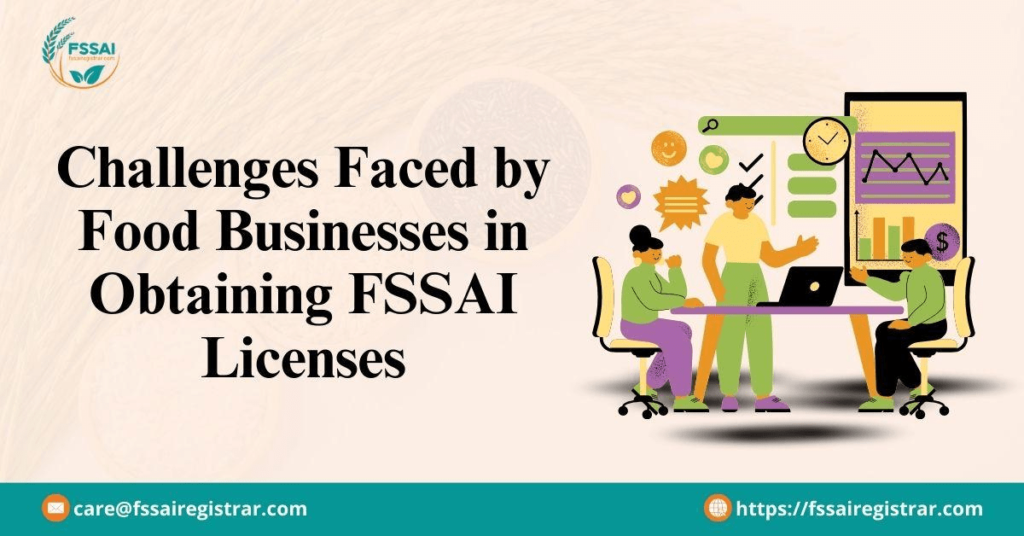Obtaining an FSSAI License is a crucial step for any food business in India to ensure compliance with food safety regulations. However, many food businesses encounter several challenges during this process. Here are some of the common obstacles faced:
Complex Regulatory Framework:
The FSSAI regulations encompass a wide range of standards and guidelines that can be overwhelming for food business operators (FBOs). Understanding and interpreting these regulations correctly can be challenging, especially for small businesses with limited resources.
Lengthy and Time-Consuming Process:
The process of obtaining an FSSAI license involves multiple steps, including documentation, inspections, and approvals. This can be time-consuming, causing delays in business operations, especially for startups eager to commence their activities.
Documentation Hurdles:
The FSSAI license application requires extensive documentation, including proof of business registration, identity proof, food safety management plans, and more. Gathering and organizing all these documents can be a daunting task, particularly for first-time applicants.
Stringent Compliance Requirements:
FBOs must adhere to stringent hygiene and safety standards as prescribed by the FSSAI. Ensuring that all aspects of the business, from sourcing raw materials to the final product, meet these standards can be challenging, especially for small and medium enterprises (SMEs).
Frequent Changes in Regulations:
The food safety regulations are periodically updated to address emerging safety concerns and industry practices. Keeping up with these changes and ensuring continuous compliance can be difficult for businesses, leading to potential violations and penalties.
Lack of Awareness and Knowledge:
Many small food business operators are unaware of the legal requirements and the importance of obtaining an FSSAI license. This lack of awareness can result in non-compliance, risking legal action, and closure of the business.
Geographical Barriers:
Businesses operating in remote or rural areas may face additional challenges due to the lack of access to FSSAI offices and resources. The logistical difficulties in such regions can impede the timely processing of license applications.
Financial Constraints:
The cost involved in obtaining and maintaining an FSSAI license can be significant, particularly for small businesses. The expenses related to compliance, documentation, and possible infrastructure upgrades can strain their financial resources.
Inspection and Approval Delays:
The mandatory inspections by FSSAI officials can sometimes be delayed due to various reasons, including the unavailability of inspectors or backlog in processing applications. Such delays can stall business operations and cause frustration among FBOs.
Technical Challenges:
The FSSAI application process is increasingly moving online, requiring businesses to submit applications and documents digitally. For those not well-versed with digital platforms, this shift can pose technical challenges and hinder the application process.
Strategies to Overcome Challenges in Obtaining FSSAI Licenses
Given the numerous challenges faced by food businesses in obtaining FSSAI licenses, adopting specific strategies can help streamline the process and ensure compliance. Here are some effective approaches to tackle these obstacles:
Professional Guidance and Consultancy:
Engaging with professional consultants who specialize in FSSAI regulations can significantly ease the process. These experts can provide valuable insights, assist with documentation, and ensure that all compliance requirements are met efficiently.
Training and Awareness Programs:
Conducting regular training and awareness programs for employees and business owners can enhance their understanding of FSSAI regulations. This knowledge can help in better adherence to safety standards and smoother application processes.
Simplified Documentation Processes:
Utilizing checklists and templates for required documents can simplify the preparation and submission process. Businesses can also invest in digital tools to organize and manage documentation more effectively.
Staying Updated with Regulations:
Subscribing to FSSAI newsletters, attending industry seminars, and regularly visiting the FSSAI website can help businesses stay informed about regulatory changes. This proactive approach ensures continuous compliance and reduces the risk of violations.
Leveraging Technology:
Adopting digital solutions for the application process can help businesses navigate online submissions more efficiently. Investing in user-friendly software and seeking technical support when needed can mitigate the challenges posed by digital platforms.
Financial Planning and Budgeting:
Proper financial planning and budgeting for FSSAI compliance-related expenses can help businesses manage costs better. Allocating funds specifically for licensing, inspections, and infrastructure upgrades can prevent financial strain.
Collaborating with Industry Peers:
Networking with other food business operators can provide valuable insights and shared experiences. Learning from peers who have successfully obtained FSSAI licenses can offer practical tips and best practices.
Engaging with Local Authorities:
Building good relationships with local FSSAI officials and authorities can facilitate smoother inspections and quicker approvals. Regular communication and seeking guidance from these officials can help address any procedural challenges.
Efficient Inspection Preparation:
Preparing thoroughly for FSSAI inspections by conducting internal audits and ensuring all safety standards are met can expedite the approval process. Addressing potential issues proactively can prevent delays and rejections.
Accessing Government Resources:
The government often provides resources and support for small businesses to comply with FSSAI regulations. Utilizing these resources, such as subsidies, training programs, and informational portals, can ease the compliance burden.
Note: Apply for fssai license renewal through fssai portal.
Conclusion
While obtaining an FSSAI license is essential for ensuring food safety and building consumer trust, the challenges associated with the process can be significant. Addressing these challenges requires awareness, proper planning, and possibly seeking professional assistance to navigate the regulatory landscape effectively. By understanding and preparing for these obstacles, food businesses can streamline the licensing process and focus on delivering safe and quality food products to their customers.

